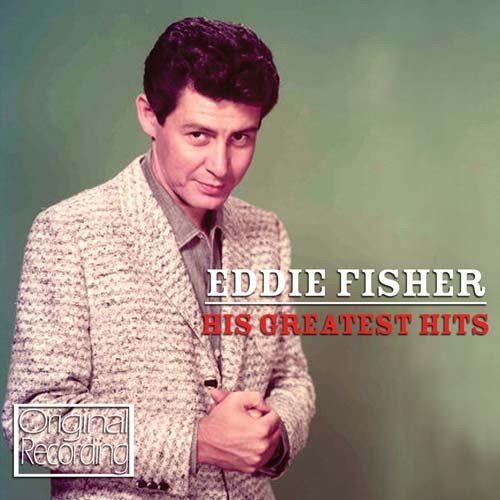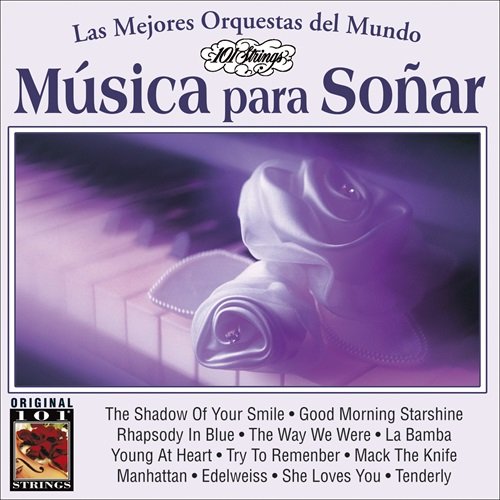Eddie Fisher - His Greatest Hits (2010)

Artist: Eddie Fisher
Title: His Greatest Hits
Year Of Release: 2010
Label: Hallmark
Genre: Vocal, Traditional Pop, Easy Listening, Oldies
Quality: Mp3 320 / Flac (tracks)
Total Time: 47:33
Total Size: 116/203 Mb
WebSite: Album Preview
Tracklist:Title: His Greatest Hits
Year Of Release: 2010
Label: Hallmark
Genre: Vocal, Traditional Pop, Easy Listening, Oldies
Quality: Mp3 320 / Flac (tracks)
Total Time: 47:33
Total Size: 116/203 Mb
WebSite: Album Preview
01. Outside Of Heaven
02. Everything I Have Is Yours
03. Downhearted
04. I'm Walking Behind You
05. Wish You Were Here
06. Oh! My Pa-Pa (O Mein Papa)
07. I Need You Now
08. (I'm Always Hearing) Wedding Bells
09. Cindy, Oh Cindy
10. Anytime
11. Heart
12. Trust In Me
13. Lady Of Spain
14. Tell Me Why
15. I'm Yours
16. Thinking Of You
17. Fanny
Eddie Fisher ranked behind only Patti Page and Perry Como as the most successful pop singles artist of the first half of the 1950s, placing 35 songs in the Billboard charts between 1950 and 1954, including 22 Top Ten hits, among them seven gold records, four of which hit number one. Fisher was part of a new generation of male singers who eschewed the intimate crooning style of Como, Bing Crosby, and Frank Sinatra in favor of a more bravura approach that sometimes recalled Al Jolson. At the height of his popularity, Fisher was a teen idol whose records sold in the millions while he earned top dollar for personal appearances and hosted his own television show.
Edwin Jack Fisher was born into a large, poor family in Philadelphia, PA, on August 10, 1928. By his early teens he was appearing on local radio shows. He served a lengthy apprenticeship that included brief stints with big bands. His first appearance on record came on the Marlin Sisters' "You Can't Be True, Dear," which made the charts in June 1948. In 1949, his manager got him a berth with Eddie Cantor, and that led to a contract with RCA Victor Records. His revival of the 1920s hit "Thinking of You" peaked in the Top Five in December 1950. He hit the charts with five singles in 1951, his progress unencumbered by his induction into the U.S. Army early in the year. In fact, his first gold record came in late 1951 with another 1920s revival, "Any Time," followed immediately by his second million-seller, "Tell Me Why," the first of seven singles he charted in 1952, among them the number one gold-selling title song from the Broadway musical Wish You Were Here and a million-selling revival of the 1930s song "Lady of Spain." That was enough to rank him the top pop singles artist of the year. (He also charted with three LPs, including two, I'm in the Mood for Love and Christmas with Eddie Fisher, that hit number one.)
Upon completing his U.S. Army service, Fisher launched his own television series, the twice-a-week, 15-minute Coke Time with Eddie Fisher, on April 29, 1953. During the year, he charted another six singles, among them the gold-selling number ones "I'm Walking Behind You" and "Oh! My Pa-Pa" (O Mein Papa). Four more singles charted in 1954, including another number one million-seller, "I Need You Now," and again Fisher was the year's top pop singles artist. He slipped to sixth place for 1955, despite charting five singles including a Top Ten rendition of "Heart," from the Broadway musical Damn Yankees, and a Top Five LP, I Love You. Several factors may have contributed to this decline, including the rise of rock & roll and his highly publicized romance with Debbie Reynolds, culminating in their marriage on September 26, 1955, which put him out of reach to his fervent female fans. (The couple had two children, the first of whom was Carrie Fisher.)
Fisher began a transition to more of an adult-oriented middle-of-the-road entertainer, with appearances in Las Vegas, while also flirting with a film career by appearing with his wife in the movie musical Bundle of Joy. He scored two more Top Ten hits in 1956 that indicated he was trying new styles: "Dungaree Doll" leaned toward rock, while "Cindy, Oh Cindy" nodded toward the incipient folk revival. In 1957, he launched a new TV program, The Eddie Fisher Show.
Fisher's image suffered due to his separation from Reynolds and affair with Elizabeth Taylor; in 1959, he divorced Reynolds and married Taylor. In between, he ended his TV show. In 1960, he launched Ramrod Records, which released a new LP, Tonight with Eddie Fisher. It gained little recognition until 1961, when 7 Arts Records licensed "Tonight" (from West Side Story), which became a hit. Unfortunately, this potential comeback was scuttled by more bad publicity as Fisher's marriage to Taylor broke up when she began an affair with Richard Burton.
Ramrod released Eddie Fisher at the Winter Garden in 1963, returning him to the charts. In 1965, he signed to Dot Records and released several albums, beginning with the chart LP Eddie Fisher Today! In 1966, he returned to RCA and scored hits with "Games That Lovers Play" and "People Like You," also charting with LPs named after the singles. There was another high-profile marriage in 1967, this time to Connie Stevens, and it produced two children, Joely Fisher and Tricia Leigh Fisher, before ending in 1969.
After You Ain't Heard Nothin' Yet! (1968), Fisher did not release another album until Bainbridge Records issued After All in 1984. Meanwhile, he plied the oldies circuit while struggling with a drug addiction he detailed in his two autobiographies, ultimately emerging drug-free. In September of 2010, Fisher broke his hip and died on the 22nd of that month at his home in Berkeley, CA following surgery complications.
Edwin Jack Fisher was born into a large, poor family in Philadelphia, PA, on August 10, 1928. By his early teens he was appearing on local radio shows. He served a lengthy apprenticeship that included brief stints with big bands. His first appearance on record came on the Marlin Sisters' "You Can't Be True, Dear," which made the charts in June 1948. In 1949, his manager got him a berth with Eddie Cantor, and that led to a contract with RCA Victor Records. His revival of the 1920s hit "Thinking of You" peaked in the Top Five in December 1950. He hit the charts with five singles in 1951, his progress unencumbered by his induction into the U.S. Army early in the year. In fact, his first gold record came in late 1951 with another 1920s revival, "Any Time," followed immediately by his second million-seller, "Tell Me Why," the first of seven singles he charted in 1952, among them the number one gold-selling title song from the Broadway musical Wish You Were Here and a million-selling revival of the 1930s song "Lady of Spain." That was enough to rank him the top pop singles artist of the year. (He also charted with three LPs, including two, I'm in the Mood for Love and Christmas with Eddie Fisher, that hit number one.)
Upon completing his U.S. Army service, Fisher launched his own television series, the twice-a-week, 15-minute Coke Time with Eddie Fisher, on April 29, 1953. During the year, he charted another six singles, among them the gold-selling number ones "I'm Walking Behind You" and "Oh! My Pa-Pa" (O Mein Papa). Four more singles charted in 1954, including another number one million-seller, "I Need You Now," and again Fisher was the year's top pop singles artist. He slipped to sixth place for 1955, despite charting five singles including a Top Ten rendition of "Heart," from the Broadway musical Damn Yankees, and a Top Five LP, I Love You. Several factors may have contributed to this decline, including the rise of rock & roll and his highly publicized romance with Debbie Reynolds, culminating in their marriage on September 26, 1955, which put him out of reach to his fervent female fans. (The couple had two children, the first of whom was Carrie Fisher.)
Fisher began a transition to more of an adult-oriented middle-of-the-road entertainer, with appearances in Las Vegas, while also flirting with a film career by appearing with his wife in the movie musical Bundle of Joy. He scored two more Top Ten hits in 1956 that indicated he was trying new styles: "Dungaree Doll" leaned toward rock, while "Cindy, Oh Cindy" nodded toward the incipient folk revival. In 1957, he launched a new TV program, The Eddie Fisher Show.
Fisher's image suffered due to his separation from Reynolds and affair with Elizabeth Taylor; in 1959, he divorced Reynolds and married Taylor. In between, he ended his TV show. In 1960, he launched Ramrod Records, which released a new LP, Tonight with Eddie Fisher. It gained little recognition until 1961, when 7 Arts Records licensed "Tonight" (from West Side Story), which became a hit. Unfortunately, this potential comeback was scuttled by more bad publicity as Fisher's marriage to Taylor broke up when she began an affair with Richard Burton.
Ramrod released Eddie Fisher at the Winter Garden in 1963, returning him to the charts. In 1965, he signed to Dot Records and released several albums, beginning with the chart LP Eddie Fisher Today! In 1966, he returned to RCA and scored hits with "Games That Lovers Play" and "People Like You," also charting with LPs named after the singles. There was another high-profile marriage in 1967, this time to Connie Stevens, and it produced two children, Joely Fisher and Tricia Leigh Fisher, before ending in 1969.
After You Ain't Heard Nothin' Yet! (1968), Fisher did not release another album until Bainbridge Records issued After All in 1984. Meanwhile, he plied the oldies circuit while struggling with a drug addiction he detailed in his two autobiographies, ultimately emerging drug-free. In September of 2010, Fisher broke his hip and died on the 22nd of that month at his home in Berkeley, CA following surgery complications.



![Noga - Heroes in The Seaweed (2025) [Hi-Res] Noga - Heroes in The Seaweed (2025) [Hi-Res]](https://www.dibpic.com/uploads/posts/2026-02/1771663366_nhs500.jpg)
![Tom Braxton - Flashback (2026) [Hi-Res] Tom Braxton - Flashback (2026) [Hi-Res]](https://www.dibpic.com/uploads/posts/2026-02/1771426129_1.jpg)
![Ragini Trio - 3 (2026) [Hi-Res] Ragini Trio - 3 (2026) [Hi-Res]](https://img.israbox.com/img/2026-02/19/uoki2dxo3dfz215xa2kz53gcp.jpg)
![Bei Bei - Two Moons (2025) [Hi-Res] Bei Bei - Two Moons (2025) [Hi-Res]](https://img.israbox.com/img/2026-02/19/j5lae93g4obtper3un20ilcnv.jpg)

